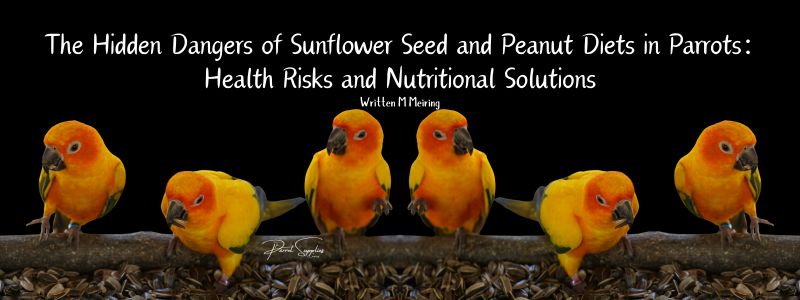The Hidden Dangers of Sunflower Seed and Peanut Diets in Parrots: Health Risks and Nutritional Solutions
Bird enthusiasts commonly feed parrots a diet predominantly composed of sunflower seeds and peanuts. However, reliance on these foods can lead to significant health issues due to their nutritional imbalances and potential contaminants. This article, supported by scientific research and avian veterinary insights, delves into the specific health concerns associated with such diets.
Nutritional Imbalances
Sunflower seeds and peanuts are notably high in fats. While fats are essential for energy, an excess can lead to obesity in captive parrots, as their energy expenditure is typically lower than that of wild counterparts. Obesity in parrots has been linked to hepatic lipidosis (fatty liver disease), a condition where excessive fat accumulates in liver cells, impairing liver function. The Merck Veterinary Manual highlights that "obesity is common in companion birds" and identifies high-fat diets as a contributing factor. (merckvetmanual.com).
Moreover, these seeds are deficient in essential nutrients such as vitamin A, calcium, and certain amino acids. Vitamin A deficiency can result in squamous metaplasia of epithelial tissues, affecting the respiratory, digestive, and urogenital systems. Clinical signs include nasal discharge, sneezing, and conjunctivitis. The Merck Veterinary Manual notes that "all-seed diets... are deficient in vitamin A." (merckvetmanual.com)
Calcium deficiency, exacerbated by the high phosphorus content in seeds, can lead to nutritional secondary hyperparathyroidism. This imbalance affects bone density and can cause skeletal deformities. The Merck Veterinary Manual states that "seed-based diets are well known for their calcium: phosphorus imbalance." (merckvetmanual.com)
Potential Contaminants
Peanuts, particularly those of substandard quality or improperly stored, are susceptible to contamination by Aspergillus flavus, a fungus that produces aflatoxins. Aflatoxins are potent carcinogens and can cause liver damage in parrots. The Hagen Avicultural Research Institute (HARI) emphasizes that "the concern for feeding peanuts is that the shells are known to harbour the mould Aspergillus flavus which can cause Aspergillosis in parrots." (hari.ca).
Behavioural Concerns
Diets high in fats and deficient in essential nutrients can also influence parrot behaviour. Excessive energy intake without adequate physical activity may lead to hyperactivity or increased aggression. Additionally, nutritional deficiencies can cause feather plucking and other self-mutilation behaviours as the bird attempts to alleviate discomfort or irritation.
Recommendations for a Balanced Diet
To mitigate these health risks, avian veterinarians recommend a balanced diet comprising:
· Formulated Pellets: These are designed to provide a comprehensive nutritional profile, ensuring that parrots receive essential vitamins and minerals. The Merck Veterinary Manual advises that "obese birds should be converted to a pelleted diet with portion control." (merckvetmanual.com)
· Fresh Vegetables and Fruits: Incorporating a variety of produce supplies necessary nutrients and promotes foraging behaviour, which is beneficial for mental stimulation. It is recommended that "fresh fruit and vegetables should account for 20-25% of your bird's daily dietary intake", depending on species.
- Seeds and Nuts: While these can be included, they should constitute a minimal portion of the diet, primarily as treats or for training purposes. This approach ensures that parrots do not consume excessive fats. Nuts and seeds should only comprise 10-15% of a parrot’s diet, depending on the parrot species.
Transitioning Diets
Shifting a parrot from a seed-based diet to a more balanced regimen should be approached gradually to monitor acceptance and prevent stress. Consultation with an avian veterinarian is essential to tailor the diet to the specific species and individual health needs of the parrot.
(read our blog post on diet conversion).
Conclusion
While sunflower seeds and peanuts are palatable to parrots, their disproportionate inclusion in the diet poses significant health risks due to nutritional imbalances and potential contaminants. A diversified diet rich in formulated pellets, fresh produce, and moderated treats not only supports physical health but also enhances behavioural well-being. Prioritizing such a balanced diet is crucial for the longevity and quality of life of companion parrots.
https://www.mountpleasant.com.sg/education/choosing-the-right-diet-for-your-bird/
https://hari.ca/avian-care/feeding-peanuts-to-parrots/
https://veterinarypartner.vin.com/default.aspx?catId=102910&id=10891591&pid=19239
https://www.parrotforums.com/threads/sunflower-seeds-and-seeds-vs-pellets.65853/
https://www.petcoach.co/question/?id=24648
https://www.mountpleasant.com.sg/education/choosing-the-right-diet-for-your-bird/
https://www.thebirdschool.com/parrot-diet/pellets-food-for-thought/
https://avianenrichment.com/index.php/learn/physical-needs/diet-nutrition/where-we-go-wrong

